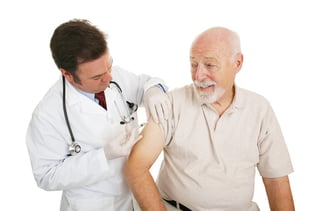 Most people don’t like the idea of getting older, and in part, this could be because it means you’re more susceptible to getting the flu. As we get older, our human immune defenses become weaker, which means that people 65 years and older bear the greatest burden during flu season.
Most people don’t like the idea of getting older, and in part, this could be because it means you’re more susceptible to getting the flu. As we get older, our human immune defenses become weaker, which means that people 65 years and older bear the greatest burden during flu season.
According to the Center for Disease Control, it’s estimated that between about 70 percent and 85 percent of seasonal flu-related deaths have occurred in people 65 years and older, and between 50 percent and 70 percent of seasonal flu-related hospitalizations have occurred among people in this age group.
A flu shot is the best method of defense for senior citizens to fight the flu. Getting vaccinated is especially important for people aged 65 and older because they are at a higher risk of developing serious complications from the flu.
There are different types of flu shots specifically for people age 65 and older.
High Dose Flu Vaccine
The high dose vaccine contains four times the amount of the inactivated flu virus as a regular flu shot, and promotes a higher antibody production that acts as the protective immune response.
Learn more about the high dose flu vaccine here
Adjuvanted Flu Vaccine
The adjuvanted flu vaccine is a standard dose flu vaccine that contains an inactivated flu vaccine and is made with an additive (also known as an adjuvant) that can create a stronger immune response to vaccination.
Learn more about the adjuvanted flu vaccine here
Side effects:
Both vaccines may result in temporary side effects that are mild but can include pain, redness or swelling at the injection site, headache, muscle ache, and malaise, and typically only last a day or two.
Prevention
In addition to getting a flu shot, older adults should also take other preventative actions such as:
- Staying up to date on the pneumococcal vaccination
- Avoiding others who are sick
- Washing hands often
- Covering coughs
- Drinking plenty of water
- Eating healthy foods
- Getting adequate sleep
If you do find yourself with flu symptoms such as fever, cough, sore throat, runny or stuff nose, body aches, headache, chills, fatigue, and often times vomiting and diarrhea, don't wait to do something about it - people aged 65 and older are at a higher risk of developing serious complications from the flu. If your symptoms aren't better within a couple of days, it’s crucial that you contact your medical provider.
If you haven’t received your flu shot yet, please stop by one of our clinics. We can give you more information regarding flu shots, discuss a schedule that works for you, and address any health concerns you may have. Walk-ins are welcome at the Medical Specialty Center is Gridley and Oroville – Your Everyday Health Care Clinic!
Our mission at Orchard Hospital is to provide our community with superior health care. We strive to ensure that your experience at Orchard Hospital is as pleasant and comfortable as possible. Our priority is to provide you with the care you need when you need it, with skill, compassion, and respect.



